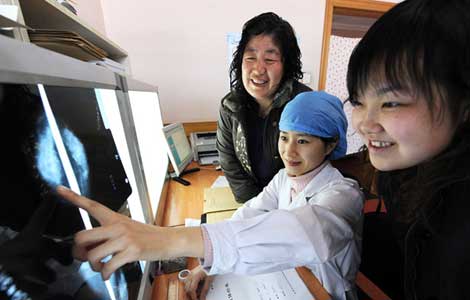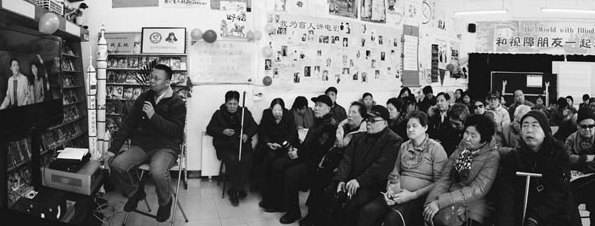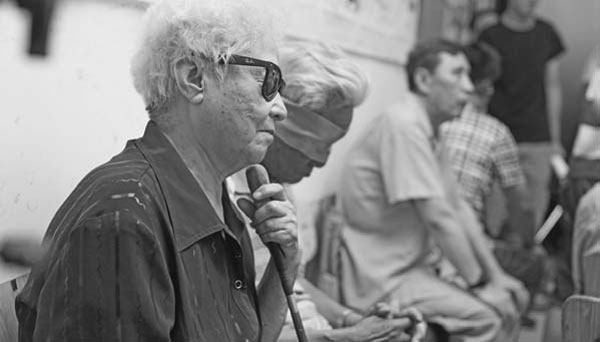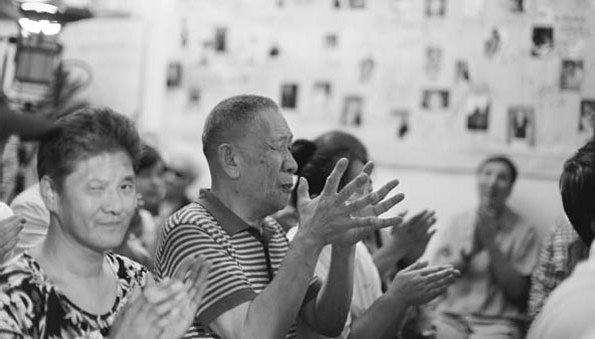Seeing by ear
Updated: 2013-08-28 07:59
By Xu Lin (China Daily)
|
||||||||
|
The visually-challenged people can also enjoy films through Wang Weili (left)'s vivid narrations at the Xinmu Cinema, on every Saturday. Photos provide to China Daily |
|
The visually-impaired people feel their life quality been much improved thanks to Hongdandan's various activities. |
|
People attend the launch ceremony of Wang's The Handbook of Visual Narration, which gives instructions on narrating films. |
If you could see poorly or not at all, would you go to the movies? You might now, thanks to an NGO that makes films and other imagery come to life for the sight-impaired, Xu Lin reports.
Each Saturday morning in Beijing, dozens of visually impaired people gather in a 20-square-meter room to "listen to" films for free. It's Xinmu Cinema on West Gulou Street, where they can totally enjoy the movie thanks to a volunteer's vivid description of the details that they have difficulty seeing.
The cinema is only one of Beijing Hongdandan Education and Culture Exchange Center's programs to improve the life quality of the visually challenged. The center gives many of them a chance to go out of their houses to do whatever they want to do, such as singing, recitation and even drama.
Like many others, Liu Fenglin, 54, from Beijing's Changping district, first came to Hongdandan only to enjoy the movies.
"I like being here. It's like a family. They look after us very well, such as serving us drinking water and helping us across the road when we leave," says Liu, who is a farmer and runs a small grocery.
Thanks to the NGO's training, she also realized her childhood dream - to perform on stage. She not only does recitations and singing, but also plays the leading role in Hong-dandan's The Facial Mould of a Maid by the Seine, the first reading drama in China performed by visually challenged people. The performance is being staged in five cities.
"I used to be self-abased. I dared not speak to others because I would blush with shame. But now I'm more confident and happier. I get along with others very well," she says.
According to China Disabled Persons' Federation, there are about 17 million people with limited sight in China. Hong-dandan's secretary general Zheng Xiaojie, who founded the non-governmental organization in 2003, says most of them just stay at home due to the inconvenience of transportation.
She wants to change the situation.
"Visual impairment makes a profound impact on one's life quality. The life quality of this group defines the life quality of our whole society," says Zheng's husband Wang Weili, who established the cinema in 2005, and trains many volunteers to describe films.
When Wang started to train broadcasters at Hongdandan, he found that the lack of reference to imagery affects their lives in many aspects.
He points out that Braille is marked with phonetic symbols, but is not ideographic.
"The hearing-impaired have hearing aids, and the limb-impaired have artificial limbs. But what do the visually challenged have? They can't even see the everyday things in society. So you have to tell them what you see," he says.
Once they can "see" the world by hearing, he says, they can process information.
Wang trains the volunteers by asking them to climb stairs blindfolded or play games, so they can experience how the visually impaired know the world.
He uses senses they have in common - such as being sweaty to explain the feeling of the sun. The more detailed, the better, he says.
"Sometimes, the sense of touch can substitute for language, to guide them into the movies quickly," he says. For example, when Wang described Hollywood hit Jurassic Park, he bought many dinosaur models, so that they could visualize how a giant tyrannosaurus rex looks by their fingertips.
Wang recently completed The Handbook of Visual Narration to guide people to describe films to the visually impaired.
But Hongdandan's visual narration programs are not just about films. They also offer other public-spirited projects to make the visually impaired people's lives more colorful, from touching sculptures to providing descriptions of photos, sports competitions and dramas.
The NGO regularly organizes groups for tours, with guides to tell them about the pretty scenery. Hongdandan took 25 visually impaired people to Bashang Grassland in Hebei province to ride horses in June. For many of them, it was the first time they stepped out of Beijing.
According to Hongdandan, among the more than 2,000 public libraries in China, only about 100 have reading rooms for the visually impaired. Only China Digital Library for Visual Impairment and Hongdandan's Xinmu Library offer voice books.
Hongdandan recruits volunteers from universities and enterprises to record the latest voice books, with all the information such as illustrations and binding and layout designs. By 2015, it aims to train 10,000 volunteers and record 10,000 voice books every year.
While she's helping the visually impaired, Zheng says, they are changing her as well. "I'm the biggest beneficiary," she says.
She has learned how to raise funds and provide professional services, and she's putting Hongdandan on a path to support itself by some programs.
Zheng used to be a TV distributor, and wanted to do something more meaningful.
In 2003, she started to shoot Life on Line, a series of documentaries about physically challenged people, which was shown on China Education Television.
"I never believed that someone would lead such a bitter life. For example, some were deserted by family, and some sought help, but nobody cared," she says.
Unable to find sponsors for the documentaries, she invested 1.2 million yuan of her own, which were all her savings and relocation compensation for her house. In the most difficult time, she had to use the money from her son's savings.
As she learned more about how the visually impaired could hardly integrate into society, she decided to establish Hongdandan.
"My family all support me. I'm very grateful that as long as I want to do it, they will be on my side," she says. Wang used to be a businessman, but came to help her with Hongdandan. Their son also works there.
However, the biggest difficulty is covering Hongdandan's operating costs.
Last year was the first time the NGO could make ends meet, thanks to the government purchase of their programs and support from enterprises and foundations.
Each of the eight full-time employees earns more than 3,000 yuan per month and there are expenses for the nine full-time volunteers.

But Zheng says it's the best time, because all staff members didn't have a salary before April, 2007.
"Everyone should make some contribution to charity work. Our aim is to integrate the social resources, not to rely on government support," she says.
Zheng also hopes employment opportunities for the visually impaired, which is a global issue, can be expanded in China.
"In the West, there are many job opportunities for them, such as lawyers and wine tasters. But in China, the only massive job market is massage. There are only a few piano tuners."
Contact the writer at xulin@chinadaily.com.cn.
(China Daily USA 08/28/2013 page10)

 Five apps to help you 'breathe' in Beijing
Five apps to help you 'breathe' in Beijing
 Wozniacki survives battle with Chinese qualifier
Wozniacki survives battle with Chinese qualifier
 Moscow air show opens with flight demonstrations
Moscow air show opens with flight demonstrations
 US preparing for probable strike on Syria
US preparing for probable strike on Syria
 Putting money on full moon
Putting money on full moon
 Language list aims to pass on Chinese culture
Language list aims to pass on Chinese culture
 Cancer patient delivers healthy baby
Cancer patient delivers healthy baby
 Chinese navy starts escort mission at Gulf of Aden
Chinese navy starts escort mission at Gulf of Aden
Most Viewed
Editor's Picks

|

|

|

|

|

|
Today's Top News
US envoy to visit DPRK to secure prisoner's release
US 'must consider impact' of winding down QE
China gearing up for plenary session
Japan suspends rocket launch at last minute
Global expertise a scarce asset for employers
Sino-Japanese meeting at G20 ruled out
New time limits for visa processing
Trending news across China
US Weekly

|

|










